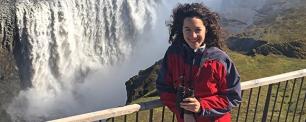“A temperature rise of 2ºC could have irreversible effects on the planet”
We interviewed Sara Marañón, a postdoctoral researcher at CREAF with a Marie Curie grant.
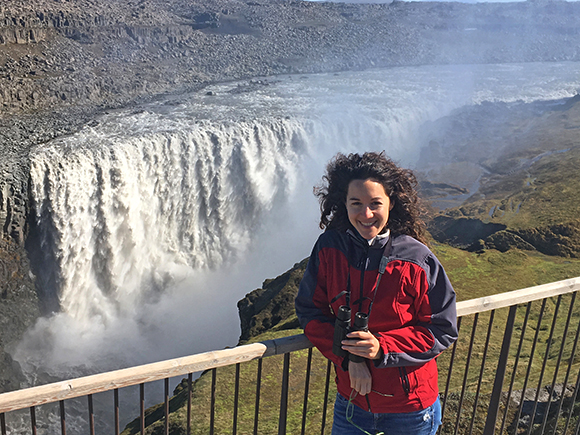
Sara Marañón's career, which mainly revolves around soil microbial ecology, has taken her across most of Europe. She secured a return to Spain a year ago and now works at CREAF, thanks to a Marie Curie grant, although Iceland is her laboratory of choice. She discusses her research there in this interview, along with topics such as the ForHot consortium and its study of the effects of warming on ecosystems, and the extra challenges and difficulties female scientists face.
How did your career begin and what brought you to CREAF?
I studied environmental science at Malaga and did my first research, with a CSIC grant, at Granada. That was where I wrote my doctoral thesis, on the influence of burnt wood on carbon sequestration and the regeneration of vegetation in the ecosystem. After that, I moved around a lot. In 2011, with the economic crisis in full swing, I went to Leipzig, in Germany, to do work related to the Integrated Carbon Observation System as a postdoc. In 2015 I received a Talent Hub grant to go to Antwerp, in Belgium. From there, I travelled back and forth to Iceland to study how soil microbial activity is affected by warming. I also looked at how such activity is affected by severe droughts upon my return to Andalusia. I've been working at CREAF since September 2017, thanks to a Marie Curie grant, and am continuing my research on the effects of climate change on soil biogeochemical cycles..
Was going to work abroad an easy decision to make?
It's something you have to accept if you want to work in science in Spain nowadays, as all the funding programmes place a lot of emphasis on internationalization. There are no guarantees of there being a job here for you someday though. Researchers often go from one postdoc position to another in different countries, and you have to adapt to the opportunities open to you. That entails instability on every level, reduces your scientific productivity, and is an obstacle to coherent research and continuity in your scientific career.
Researchers often go from one postdoc position to another in different countries. That entails instability on every level, reduces your scientific productivity, and is an obstacle to coherent research and continuity in your scientific career.
Why did you come back to Spain?
After spending several years abroad, and relocating almost every year, I wanted to come back to my country and be nearer to my family. CREAF gave me an opportunity to take up some of my previous lines of research again, such as forest and fire ecology and plant ecophysiology, as well as to continue my current work on soil microbial ecology and to collaborate with lots of its research groups. Emigrating Spaniards always say we hope to return one day, but not at any price. With a Marie Curie grant, you can come back and enjoy decent conditions.
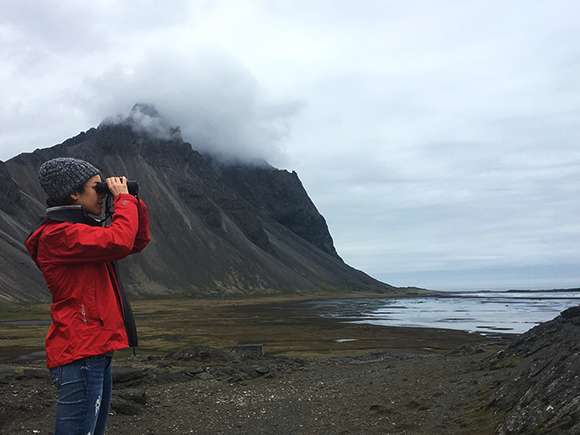
Over and above the difficulties you've already mentioned, what's your view on gender discrimination in science? Have you ever been treated differently because you're a woman?
Yes. You sometimes have to try harder to give the impression you're much more assertive and self-confident so that people respect your opinion as much as that of a man. Because I'm a woman, I've had to exert my authority more when defending my ideas, delegating tasks and directing a work group. I've often noticed that my male colleagues have much less trouble making themselves heard.
Because I'm a woman, I've had to exert my authority more when defending my ideas, delegating tasks and directing a work group.
Do you think that only happens in science?
It isn't unique to scientific research. There are lots of other fields in which the alpha male figure is the most successful, and that's a role usually played by a man, although not always. Our upbringing and the values we're taught as children are sometimes detrimental to women. Little girls are still brought up to be cautious, obedient, modest and moderate, rather than to be brave, take risks and face up to challenges.
Let's talk about your research. You work here but Iceland is your laboratory. What do you like about Iceland?
Its landscapes, the calm and silence everywhere. And its people! They're so stoical [the project Sara is working on with her Marie Curie grant is called 'StoiCa']. They're relaxed and friendly, and enjoy life's little pleasures, although Iceland's isolation has also made them independent, self-sufficient and very good at overcoming problems.
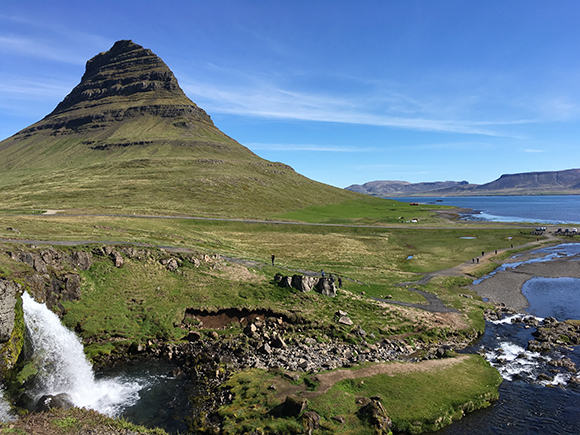
What makes Iceland a good place for research?
There's a lot of geothermal activity there and it causes progressive temperature gradients in the ground. We can use those temperature gradients as a 'natural laboratory' for studying what would happen in different scenarios involving rises in the planet's temperature. Additionally, as there are both new geothermal gradients, which appeared as the result of an earthquake in 2008, and some that have existed for over 50 years, we can, for the first time, infer adaptation processes and make long-term projections regarding the effects of climate change on soil.
Our upbringing and the values we're taught as children are sometimes detrimental to women. Little girls are still brought up to be cautious, obedient, modest and moderate, rather than to be brave, take risks and face up to challenges.
And how does warming affect soil?
When the temperature rises, the metabolism of soil microorganisms speeds up. They become more active and consume more soil carbon, which is what they feed on. As their rate of respiration increases too, they release the carbon they've consumed into the atmosphere in the form of carbon dioxide, CO2. Warming caused by geothermal activity has therefore led to substantial soil carbon loss.
What projections can be made on that basis?
The release of a greater quantity of CO2 into the atmosphere generates a loop or positive feedback. If the Earth's temperature increases, more soil carbon will be lost and released into the atmosphere as CO2, contributing to the planet's temperature rising further. That suggests there could be a point of no return, which is why it's so important to keep the global temperature from getting much higher. A rise of 2ºC might seem insignificant, but it could have irreversible effects on many of the planet's ecological processes.
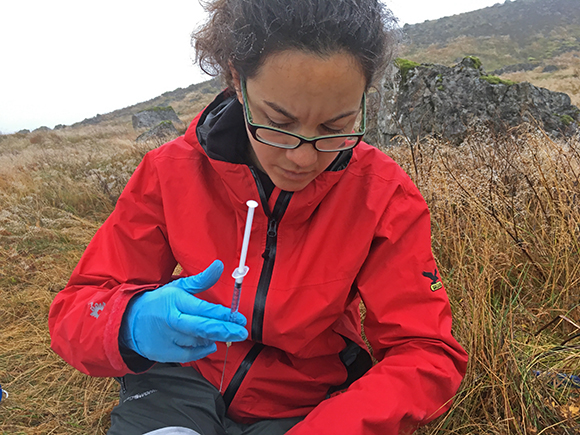
There's a lot of geothermal activity there and it causes progressive temperature gradients in the ground. We can use those temperature gradients as a 'natural laboratory' for studying what would happen in different scenarios involving rises in the planet's temperature.
Your research also encompasses nitrogen. Does the same apply to nitrogen as to carbon?
We've discovered that, contrary to what people thought, warming also causes soil nitrogen loss in high-latitude ecosystems. The vegetation of such ecosystems tends to be limited because of a lack of soil nitrogen, as its rate of release through the decomposition of organic matter is very slow because of the cold. Increases in temperature and microorganism activity speed up the release of soil nitrogen. It's generally assumed that this would result in more plant growth and, in turn, more carbon in the ground, possibly even compensating for carbon losses caused by microorganisms' respiration.
In Iceland, however, we've observed that carbon and nitrogen are being lost in equal proportion. Nitrogen is dissolved in water or lost in the form of gases due to soil bacteria activity. In any case, the vegetation can't use the nitrogen microorganisms are making available, so plants' productivity hasn't increased as expected and they won't be releasing so much carbon into the soil. The overall loss of soil carbon and its contribution to increased levels of CO2 in the atmosphere could therefore be greater than we thought.
The release of a greater quantity of CO2 into the atmosphere generates a loop or positive feedback. If the Earth's temperature increases, more soil carbon will be lost and released into the atmosphere as CO2, contributing to the planet's temperature rising further.
Your studies are part of the activity of a large group called ForHot. Can you explain what ForHot is?.
ForHot [from the words 'forest' and 'hot'] is a consortium of researchers from all over Europe. Since being established in 2012, it has acted as a network that has attracted people from very different disciplines, and is actually still growing exponentially. We all share an interest in studying the effects of warming on ecosystem processes. Our work is like a jigsaw that takes shape when you put all the pieces together. Our strengths are interdisciplinarity and teamwork, and ForHot's coordinator, Bjarni Sigurdsson, does a great job of avoiding overlaps and maximizing synergy and cooperation between the different groups. ForHot is set to become an Innovative Training Network, allowing for 15 PhD students to join the project and receive interdisciplinary training in an exceptional 'natural laboratory'.
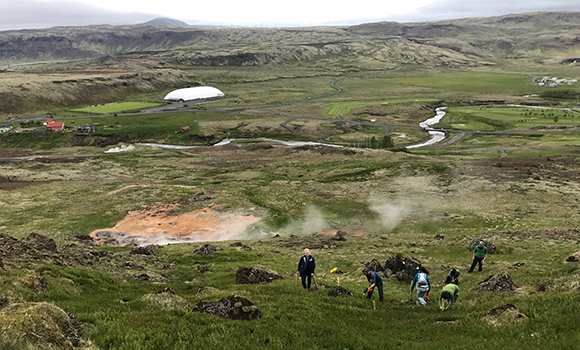
What lines of research is ForHot working on at present?
Lots. We're studying the effects of temperature on vegetation's productivity, nutritional state, composition and phenology; on the composition and activity of soil microorganism communities, the decomposition of organic matter, and root exudates and productivity; and on the role of mycorrhizas, greenhouse gas emission, and nematodes, earthworms and microarthropods, among other things. Pooling all the advances in our research each year is really exciting.
I realized my family didn't understand why I was always traveling or why I spent Sundays in the lab. My sister asked why I needed to go to Iceland instead of just taking soil from the local park"
One last question… You've recently started using social media. What's behind that decision?
I realized my family didn't understand why I was always traveling or why I spent Sundays in the lab. My sister asked why I needed to go to Iceland instead of just taking soil from the local park. I wanted to explain to them what I was doing and thought that Twitter (@SMaranonJimenez) and, in particular, Instagram (@smaraonjimenez), because of photos, had a lot of potential for that. They can be useful tools for telling people unfamiliar with our field of study about what we do.
RELATED ARTICLES
Marañón-Jiménez S., Soong J.L. Leblans N.I.W., Sigurdsson B.D., Peñuelas J., Richter A., Asensio D., Fransen E., Janssens I.A. (2018). Geothermally warmed soils reveal persistent increases in the respiratory costs of soil microbes contribuiting to substantial C losses. Biogeochemistry, 138: 245-260. DOI: https://doi.org/10.1007/s10533-018-0443-0


